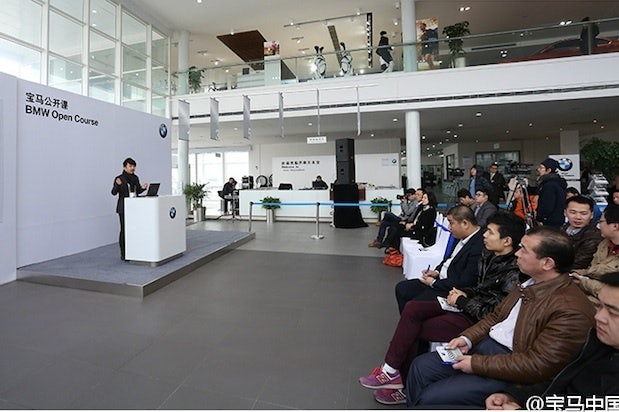
A photo from a BMW "Open Course" event posted on BMW's Sina Weibo account. (Sina Weibo/BMW)
While many consumers in China’s first-tier cities are inundated with information about luxury brands, companies across the industry have been puzzling over how to educate newly wealthy consumers across the rest of the country. In response, luxury auto brand BMW is joining a number of companies taking the 'education' goal literally: it's hosting classes.
According to Financial Times, BMW’s series of China-specific “Open Course” classes in third-tier cities serve to attract and inform newly wealthy potential buyers. The three-hour interactive sessions are open to anyone, and feature auto expert speakers, bringing in both BMW owners and possible customers without an “overt sales pitch.” After the events, attendees are welcome to visit the dealerships to check out the vehicles.
While there has been much talk of China’s luxury consumers in first-tier cities becoming increasingly sophisticated, the country also boasts a large and growing number of newly wealthy in a vast number of locations. BMW is hosting its classes in cities like mineral-rich Nanning, the capital of Guangxi. The company is looking toward the next phase of growth: according to Bernstein research, eight of China’s 10 fastest-growing car markets are actually located in poorer provinces. Currently, more than half of BMW’s 420 dealerships in China are located in “lower-tier” cities.
The education program is similar to efforts being taken by other companies in the luxury industry, such as auction houses and wine and spirits retailers. Both Sotheby’s and Christie’s have been expanding their education programs in Hong Kong and the mainland, while Chinese wine retailers often offer tasting classes. Some companies, such as Pernod Ricard, fly VIP Chinese customers to Europe to learn about the brand.
This “luxury education” boom has also led to the popularity of finishing schools in China, where affluent young women pay upwards of US$16,000 for training courses on Western etiquette. Many of these efforts appeal to fears among China’s newly affluent of the dreaded labels of “tuhao” (土豪) or “baofahu,” (暴发户) Chinese terms connoting crass, uncultured nouveau riche that are often associated with the country’s wealthy “coal bosses.”
This rise in consumer education serves as a form of “soft sell” and helps luxury brands to capture more meaningful engagement with a select group of Chinese consumers that can’t be achieved from traditional forms of advertising, while at the same time creating a new consumer class of connoisseurs.